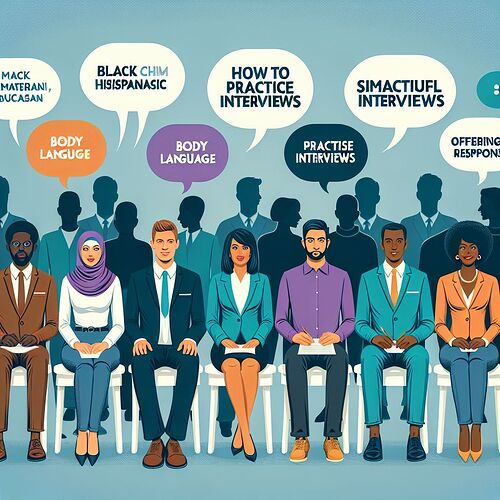Preparing for an interview can be daunting, especially if you are new to the process. However, with the right approach and techniques, you can significantly improve your interview skills and boost your confidence.
This guide outlines 15 effective ways to enhance your interview skills:
- Research the Company
- Practice Common Interview Questions
- Dress Appropriately
- Arrive Early
- Bring Necessary Documents
- Show Enthusiasm
- Listen Carefully
- Ask Insightful Questions
- Be Honest
- Highlight Your Strengths
- Stay Calm and Composed
- Follow Up
- Learn from Feedback
- Practice Body Language
- Be Yourself
Before attending an interview, thoroughly research the company. Understand its mission, values, and recent achievements. This will not only help you tailor your responses but also demonstrate your genuine interest in the role.
Example: “I noticed that your company recently launched a new sustainability initiative. Can you tell me more about it and how it impacts the role I’m applying for?”
Familiarize yourself with common interview questions and practice your responses. This will help you articulate your thoughts clearly and confidently during the actual interview.
Example: “Can you describe a time when you faced a challenge at work and how you overcame it?”
First impressions matter. Dress in professional attire that is appropriate for the company’s culture. When in doubt, it’s better to be slightly overdressed than underdressed.
Example: For a corporate job, a suit and tie or a professional dress is suitable.
Arriving early shows punctuality and eagerness. Aim to arrive at least 10-15 minutes before your scheduled interview time.
Example: If your interview is at 10:00 AM, aim to be there by 9:45 AM.
Carry multiple copies of your resume, a list of references, and any other documents that might be relevant to the interview.
Example: Bring copies of your resume, a portfolio of your work, and reference letters.
Express genuine enthusiasm for the role and the company. A positive attitude can make a significant difference in how you are perceived.
Example: “I’m really excited about this opportunity because I’ve always admired your company’s commitment to innovation.”
Pay close attention to the interviewer’s questions and comments. Active listening shows respect and helps you provide more accurate responses.
Example: Nod and maintain eye contact to show you are engaged.
Prepare a list of insightful questions to ask the interviewer. This demonstrates your interest in the role and helps you gather important information.
Example: “Can you describe the team I would be working with and the projects they are currently focused on?”
Honesty is crucial during an interview. If you don’t know the answer to a question, it’s better to admit it than to fabricate a response.
Example: “I’m not familiar with that particular software, but I’m eager to learn and can quickly adapt to new technologies.”
Confidently discuss your strengths and how they align with the requirements of the role. Use specific examples to illustrate your points.
Example: “One of my key strengths is project management. In my previous role, I successfully led a team to complete a project ahead of schedule.”
Interviews can be stressful, but it’s important to stay calm and composed. Take deep breaths and pause if you need a moment to think before answering a question.
Example: If you feel nervous, take a deep breath and collect your thoughts before responding.
Send a thank-you email within 24 hours of your interview. Express your appreciation for the opportunity and reiterate your enthusiasm for the role.
Example: “Thank you for the opportunity to interview for the Marketing Manager position. I am excited about the possibility of joining your team and contributing to your success.”
After the interview, seek feedback from the interviewer or a mentor. Constructive feedback can help you improve for future interviews.
Example: “Could you provide any feedback on my interview performance? I’m always looking to improve.”
Non-verbal communication is important. Practice good posture, maintain eye contact, and offer a firm handshake.
Example: Sit up straight, smile, and make eye contact to convey confidence and friendliness.
Authenticity is key. Be yourself and let your personality shine through. Employers appreciate genuine candidates who are true to themselves.
Example: Share personal anecdotes that highlight your character and values.
By implementing these strategies, you can improve your interview skills and increase your chances of success. Remember, preparation and practice are essential to making a positive impression during an interview.
Did I miss anything? Add your comments below!
